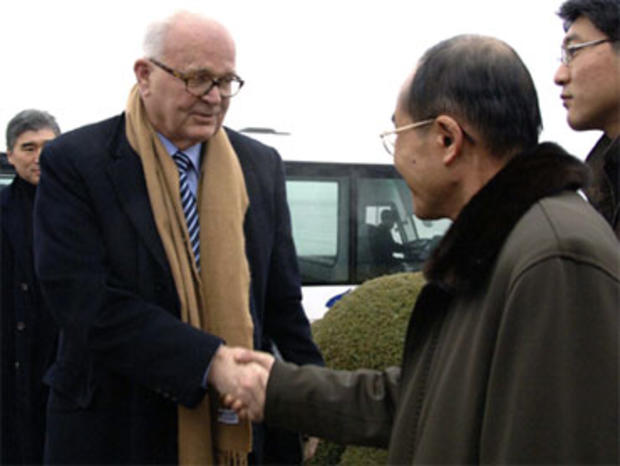U.S., North Korea to hold rare direct talks
On the 58th anniversary of the July 27, 1953 agreement to end the Korean War, diplomats from North Korea will arrive to meet face to face Thursday and Friday with an Obama administration representative at the U.S. Mission to the United Nations, looking, they say, to restart stalled talks aimed at diffusing a nuclear standoff.
North Korea's Vice Foreign Minister Kim Kye Gwan is calling for a formal peace treaty that never materialized after the Korean War and negotiations, not only with the six parties involved in the stalled negotiations (North and South Korea, China, Russia, Japan and the U.S.) but direct bilateral talks with the U.S., which have not occurred since Obama's North Korea envoy, Stephen Bosworth visited Pyongyang two years ago.
Kim will meet Bosworth again in New York on Wednesday.
The objective for the U.S. remains the same: The denuclearization of the Korean peninsula - in other words, to persuade North Korea and its leader Kim Jong Il (whose party was reelected in uncontested elections this week) to give up their nuclear weapons program.
For two years, the North Koreans have insisted on face-to-face negotiations with the Obama Administration.
Two years ago, in an unprecedented effort to deliver a message to Washington, North Korea's Ambassador to the U.N., Sin Son Ho, called CBS News to talk about denuclearization. According to Ambassador Sin, Pyongyang was prepared to negotiate directly with Washington about its nuclear weapons program.
"We are ready, any time," he said.
For several years, however, the Obama administration has insisted on holding talks with North Korea only within the framework of the six-party talks. Those negotiations have been unhinged several times, with Pyongyang returning to the development of its nuclear program and the testing of ballistic missiles.
In the 2009 phone conversation, Sin said Pyongyang "already made our position very clear: The six-party talks are gone forever. We will never participate in the six-party talks again."
There was a glimmer of hope when in June 2008 North Korea imploded the cooling tower at its main nuclear facility at Yongbyon as a condition of the six-party talks. That agreement also included vows for significant international aid to the North, but that aid never materialized. The U.N. imposed sanctions, and the talks stalled.
In the back and forth over the years Kim Jong Il's regime has banned International Atomic Energy Agency inspections, walked away from the Nuclear Non-Proliferation Treaty, and restarted its nuclear testing - even during the direct engagement days of the Clinton Administration.
But times have changed. U.S. Secretary of State Hillary Rodham Clinton met the North Korean foreign minister, Pak Ui Chun, at the ASEAN Regional Forum recently.
"This will be an exploratory meeting to determine if North Korea is prepared to affirm its obligations under international and Six Party Talk commitments, as well as take concrete and irreversible steps toward denuclearization," Clinton said at the time.
The North Korean delegation, which consists of a seven officials including Kim, is being hosted by the National Committee on American Foreign Policy (NCAFP), an NGO founded in 1974, which will have meetings with the North Koreans on Monday.
"The time is right," said Donald S. Zagoria, senior vice president and project director of the Forum on Asia-Pacific Security. "We brought them here and are hosting them for private, unofficial meetings and have done so since 2003, when it has been feasible."
Zagoria, a long-time professor, also served as a consultant during the Carter administration at both the National Security Council and the Bureau of East Asian and Pacific Affairs of the State Department.
"The fact that North and South Korean nuclear negotiators met for the first time in Bali recently at the sidelines of a meeting of the Association of Southeast Asian Nations is a good sign that they will return to the six-party talks," Zagoria said, adding, "Since the six-party talks stalled, the North Koreans have tested nuclear weapons and unveiled a uranium enrichment program: they have been unrestrained."
The challenge, he said, will be finding movement on both sides.
"Right now they are talking peace treaty and we are talking denuclearization, but there seems to be an interest on both sides in returning to the negotiating table, particularly at a time when North-South relations are improving," Zagoria said.
Clinton expressed concerns after her Indonesia trip that tensions are still high on the Korean peninsula and the South China Sea and were not yet at the point where she would say they were resolved.
So, why now? The Obama Administration got a wake-up call when the world ignored the Korean peninsula. Last year, two deadly attacks killed 50 South Koreans. In 2010, Ambassador Sin warned that his country would respond militarily to any U.N. Security Council condemnation over the sinking of a South Korean warship which Seoul blamed on Pyongyang.
Last March, in testimony to the Senate Foreign Relations Committee, Bosworth said, "North Korea has repeatedly reneged on its commitments under the September 2005 Joint Statement made in the context of the Six-Party Talks."
"At the beginning of his administration, President Obama expressed a willingness to engage North Korea. It responded by conducting missile tests, expelling IAEA inspectors, announcing a nuclear test, disclosing its uranium enrichment program, and stating that the Six-Party Talks were 'dead.' It also expelled the U.S. personnel delivering food aid to the North Korean people," added Bosworth.
Its unclear what success the new negotiations might bring. There's an upside for Pyongyang: The North could receive a renewed commitment for desperately needed economic aid as well as possible diplomatic recognition from the United States and, they hope, that long-sought-after formal treaty to end the Korean War.
For the Obama Administration, it's an opportunity to put out at least one troubling foreign policy fire as the U.S. election year begins in earnest - and to dismantle a dangerous nuclear program along the way.

